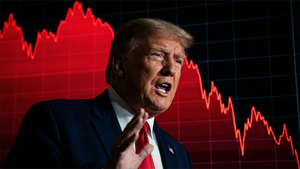
Volatility cuts both ways - while it creates opportunities, it also increases risk, making sharp declines just as likely as big gains. This unpredictability can shake out even the most experienced investors.
These stocks can be a rollercoaster, and StockStory is here to guide you through the ups and downs. Keeping that in mind, here are three volatile stocks to avoid and some better opportunities instead.
Seagate Technology (STX)
Rolling One-Year Beta: 1.98
The developer of the original 5.25inch hard disk drive, Seagate (NASDAQ: STX) is a leading producer of data storage solutions, including hard drives and Solid State Drives (SSDs) used in PCs and data centers.
Why Does STX Fall Short?
- Annual sales declines of 3.8% for the past five years show its products and services struggled to connect with the market during this cycle
- High input costs result in an inferior gross margin of 28.4% that must be offset through higher volumes
- Low free cash flow margin of 8.3% for the last two years gives it little breathing room, constraining its ability to self-fund growth or return capital to shareholders
At $117.90 per share, Seagate Technology trades at 13.2x forward P/E. Check out our free in-depth research report to learn more about why STX doesn’t pass our bar.
Marriott (MAR)
Rolling One-Year Beta: 1.09
Founded by J. Willard Marriott in 1927, Marriott International (NASDAQ: MAR) is a global hospitality company with a portfolio of over 7,000 properties and 30 brands, spanning 130+ countries and territories.
Why Is MAR Not Exciting?
- Weak revenue per room over the past two years indicates challenges in maintaining pricing power and occupancy rates
- Estimated sales growth of 4.3% for the next 12 months implies demand will slow from its two-year trend
- Poor free cash flow margin of 9% for the last two years limits its freedom to invest in growth initiatives, execute share buybacks, or pay dividends
Marriott’s stock price of $264.27 implies a valuation ratio of 25.6x forward P/E. To fully understand why you should be careful with MAR, check out our full research report (it’s free).
Blink Charging (BLNK)
Rolling One-Year Beta: 1.15
One of the first EV charging companies to go public, Blink Charging (NASDAQ: BLNK) is a manufacturer, owner, operator, and provider of electric vehicle charging equipment and networked EV charging services.
Why Are We Cautious About BLNK?
- Earnings per share fell by 10.2% annually over the last five years while its revenue grew, partly because it diluted shareholders
- Cash-burning history makes us doubt the long-term viability of its business model
- Short cash runway increases the probability of a capital raise that dilutes existing shareholders
Blink Charging is trading at $0.73 per share, or 0.7x forward price-to-sales. Read our free research report to see why you should think twice about including BLNK in your portfolio.
Stocks We Like More
Market indices reached historic highs following Donald Trump’s presidential victory in November 2024, but the outlook for 2025 is clouded by new trade policies that could impact business confidence and growth.
While this has caused many investors to adopt a "fearful" wait-and-see approach, we’re leaning into our best ideas that can grow regardless of the political or macroeconomic climate. Take advantage of Mr. Market by checking out our Top 5 Growth Stocks for this month. This is a curated list of our High Quality stocks that have generated a market-beating return of 183% over the last five years (as of March 31st 2025).
Stocks that made our list in 2020 include now familiar names such as Nvidia (+1,545% between March 2020 and March 2025) as well as under-the-radar businesses like the once-small-cap company Comfort Systems (+782% five-year return). Find your next big winner with StockStory today for free.





